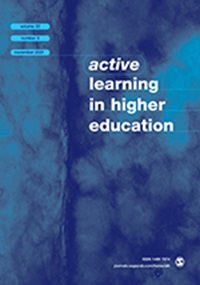Refining active learning design principles through design-based research
IF 3.8
1区 教育学
Q1 EDUCATION & EDUCATIONAL RESEARCH
引用次数: 3
Abstract
This design-based research (DBR) study had both local and general goals. Its local goal was to increase active learning in the online courses offered at a large research university in the midwestern United States. Its larger goal was to define active learning design principles for online courses in general, so that they might be used to improve the learning experience for wider audiences. While the principles of active learning can be applied to courses in any mode of delivery: flipped classroom, blended, or fully online, the importance of active learning in online courses is highlighted because active learning course design requires numerous upfront considerations. Moreover, because the pedagogical model is structured throughout the online learning environment and thus is made visible, online courses present a unique opportunity to review what is core to the principles of active learning. The design intervention (an innovative course review method) incorporated the principles of authentic e-learning. The study addressed two major research questions: (1) “To what extent does the intervention—a new course review method—indicate the extent to which active learning is present in the design of an online course?” and (2) “How do the principles of authentic e-learning incorporated in the new course review method need to be refined?” To address the first question, the online course review intervention was used to evaluate the learning activities and assessments of 75 undergraduate online courses against these authentic e-learning principles, resulting in an active learning (AL) score for each course. To address the second question, we surveyed the learners in these 75 courses about what made learning meaningful and coded the learners’ feedback in reference to the active learning design principles. The practical outcome of this DBR study is a pedagogical course review that quantifies active learning in online courses. The theoretical outcomes of this DBR study are refined active learning design principles that can serve instructors, designers, teacher educators, and administrators in enhancing the design of online courses. The findings of this study affirm that the authentic task principles as well as newly identified learner-centered design principles together can serve as evidence-based principles to define and refine active learning in online courses.通过基于设计的研究提炼主动学习设计原则
这项基于设计的研究(DBR)既有局部目标,也有总体目标。其当地目标是在美国中西部一所大型研究型大学提供的在线课程中增加积极学习。其更大的目标是为一般在线课程定义主动学习设计原则,以便用于改善更广泛受众的学习体验。虽然主动学习的原则可以应用于任何交付模式的课程:翻转课堂、混合式或完全在线,但主动学习在在线课程中的重要性得到了强调,因为主动学习课程设计需要大量的前期考虑。此外,由于教学模式是在整个在线学习环境中构建的,因此是可见的,因此在线课程提供了一个独特的机会来回顾主动学习原则的核心内容。设计干预(一种创新的课程审查方法)纳入了真实电子学习的原则。这项研究解决了两个主要的研究问题:(1)“干预——一种新的课程复习方法——在多大程度上表明了在线课程设计中主动学习的存在?”和(2)“如何完善新课程复习方法中包含的真实电子学习原则?”为了解决第一个问题,在线课程回顾干预被用于根据这些真实的电子学习原则评估75门本科生在线课程的学习活动和评估,从而得出每门课程的主动学习(AL)分数。为了解决第二个问题,我们调查了这75门课程中的学习者,了解是什么让学习变得有意义,并参考主动学习设计原则对学习者的反馈进行了编码。这项DBR研究的实际结果是对在线课程中的主动学习进行量化的教学课程审查。这项DBR研究的理论成果是完善的主动学习设计原则,可以为教师、设计师、教师教育工作者和管理人员加强在线课程的设计提供服务。本研究的结果证实,真实任务原则和新确定的以学习者为中心的设计原则可以作为基于证据的原则来定义和完善在线课程中的主动学习。
本文章由计算机程序翻译,如有差异,请以英文原文为准。
求助全文
约1分钟内获得全文
求助全文
来源期刊

Active Learning in Higher Education
EDUCATION & EDUCATIONAL RESEARCH-
CiteScore
13.20
自引率
12.00%
发文量
31
期刊介绍:
Active Learning in Higher Education is an international, refereed publication for all those who teach and support learning in higher education (HE) and those who undertake or use research into effective learning, teaching and assessment in universities and colleges. The journal is devoted to publishing accounts of research covering all aspects of learning and teaching concerning adults in higher education. Non-discipline specific and non-context/country specific in nature, it comprises accounts of research across all areas of the curriculum; accounts which are relevant to faculty and others involved in learning and teaching in all disciplines, in all countries.
 求助内容:
求助内容: 应助结果提醒方式:
应助结果提醒方式:


